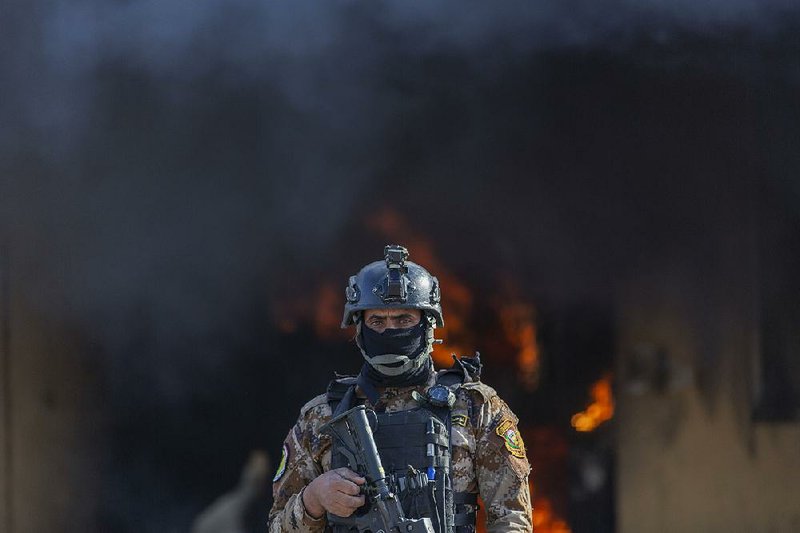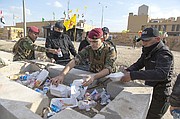BAGHDAD -- The siege by supporters of an Iranian-backed militia at the U.S. Embassy in Baghdad ended Wednesday after the militia ordered them to withdraw, spreading relief to the diplomats trapped inside and averting a potential showdown between the United States and Iran.
Supporters of the Kataeb Hezbollah militia who had spent the night camped outside the embassy dismantled their tents and marched out of the area, saying they would instead continue to press for the withdrawal of U.S. troops from Iraq through the nation's parliament.
"Yay! We burned them!" they chanted as they headed away from the embassy, a reference to the fires set by the demonstrators that burned two embassy reception areas Tuesday.
In a parting shot, some militia members hung a green banner with yellow writing on the burned reception area saying "Popular Mobilization Commission," the umbrella group for the militias, as if to remove any doubt of who was in charge.
[Video not showing up above? Click here to watch » https://www.youtube.com/watch?v=TFBsheXISQQ]
The retreat signaled an end to a crisis in which thousands of angry militia supporters attempted to storm the embassy Tuesday and threw rocks at the U.S. Marines guarding it. The crowd was protesting the deaths of 25 militia members in U.S. airstrikes Sunday. Those strikes were conducted in retaliation for the death of a U.S. contractor in a rocket attack that the U.S. military blamed on Kataeb Hezbollah.
President Donald Trump tweeted Tuesday that he blamed Iran for the assault on the embassy, raising fears of an escalating conflict, then stepped back Wednesday, saying he did not want a war with Iran.
Asked at his Mar-a-Lago Club in Florida on New Year's Eve whether he feared the crisis in Iraq would push the United States into war with Iran, Trump told reporters he hoped not. "Do I want to? No, I want to have peace. I like peace," he said. "And Iran should want to have peace more than anybody. So I don't see that happening."
Defense Secretary Mark Esper said 750 soldiers from the 82nd Airborne Division's Immediate Response Force were en route to the Middle East, with additional soldiers expected to follow in the coming days. He did not specify the soldiers' destination, but a U.S. official familiar with the decision said they will go to Kuwait.
Additional soldiers from the 82nd Airborne's quick-deployment brigade, known officially as its Immediate Response Force, were prepared to deploy, Esper said. The U.S. official, who provided unreleased details on condition of anonymity, said the full brigade of about 4,000 soldiers may deploy.
The White House referred a request for comment Wednesday to the National Security Council, which did not immediately respond.
Later in the day, Secretary of State Mike Pompeo tweeted that he had spoken with Iraqi Prime Minister Adel Abdul Mahdi, "who agreed that #Iraq would continue to uphold its responsibility to keep U.S. personnel secure and would move the Iran-backed attackers away from USEmbBaghdad." Pompeo added that the United States will "continue cooperation" with Iraq "to hold #Iran and its proxies responsible."
Pompeo postponed a trip that was scheduled to start today in Ukraine so that he can monitor developments in Iraq and "ensure the safety and security of Americans in the Middle East," said State Department spokeswoman Morgan Ortagus.
The departure of the demonstrators was probably most welcomed by the diplomats and embassy staff members who had been holed up in safe rooms for more than 24 hours.
"Everyone is breathing a sigh of relief," said Maj. Charlie Dietz, a spokesman for the U.S. military in Baghdad. "A situation that could have easily escalated out of control was handled with tactical restraint, and everyone was able to walk away."
One embassy official said he most looked forward to the opportunity to catch up on sleep. Another said his first move was to step outside to smoke his first cigarette in more than a day.
The day had begun with renewed clashes along the high wall guarding the fortified embassy, with demonstrators hurling Molotov cocktails into the compound and guards inside responding with tear gas.
The clashes eased after the senior leadership of the Popular Mobilization Forces ordered a complete withdrawal of all the demonstrators. The order was issued, a statement said, "out of respect" for an instruction issued the previous day by the Iraqi government.
Several hundred supporters of Kataeb Hezbollah and another Iranian-backed group, Harakat al-Nujaba, initially refused to comply, saying they took orders only from their own leaders.
A top Kataeb Hezbollah official then showed up outside the embassy and instructed the remaining demonstrators to leave. "You have won a victory," said Mohammed Mohyee, the group's political spokesman, addressing the crowd through a loudspeaker. "You have delivered your message. We will take our fight to expel U.S. troops from our land to parliament, and if we don't succeed, we will return.
"We don't care about these planes that are flying over the heads of the picketers. Neither do we care about the news that America will bring Marines. On the contrary, this shows a psychological defeat and a big mental breakdown that the American administration is suffering from," he said, before withdrawing from the area.
"After achieving the intended aim, we pulled out from this place triumphantly," said Fadhil al-Gezzi, a militia supporter. "We rubbed America's nose in the dirt."
Although the immediate sense of crisis appeared to have passed, the conclusion of the siege did not herald a solution to the wider problem of the growing friction in Iraq between the United States and Iran. There is a force of about 5,000 American troops in Iraq to help Iraqi security forces in the fight against the Islamic State. Iran, meanwhile, wields vast military influence in Iraq through a network of militias that, although nominally under the authority of Iraqi security forces, owe allegiance to Iran.
It was not immediately clear why Kataeb Hezbollah had called off the siege. The order to do so appeared to have been unexpected. Shortly before it was issued, a large truck arrived outside the embassy carrying tents, food and other supplies for those camping outside.
A senior Kataeb Hezbollah official said the group agreed to end the protest after receiving guarantees from Mahdi, the prime minister, that the issue of the U.S. troop presence would be raised in parliament.
Representatives of the prime minister's office did not respond to requests for comment.
"I don't think there is a good prospect at this time for the Iraqi government to cancel all security arrangements with foreign forces," said Sajad Jiyad, who heads the Bayan Center think tank in Baghdad. "And if they did, it would be very risky for Iraq."
Iran has denied involvement in the attack on the embassy. Supreme Leader Ayatollah Ali Khamenei was quoted by media as saying that "if the Islamic Republic makes a decision to confront any country, it will do it directly."
Iran later summoned the Swiss charge d'affaires, who represents American interests in Tehran, to protest what it said was war-mongering by U.S. officials. Public consular operations at the embassy were suspended and future appointments canceled, it said in a statement.
Iraq's government vehemently condemned the airstrikes on the militia, saying it violated national sovereignty. But Tehran and its allies might have also seen the attack as a way of diverting attention from Iran's own anti-government protests.
"Iran has been trying to provoke the U.S. into helping it solve its Iraq problem," said the Crisis Group, an international think tank. "The Trump administration, by responding to the attacks in Kirkuk and elsewhere with airstrikes, has obliged."
Robert Ford, a retired U.S. diplomat who served five years in Baghdad and then became ambassador in Syria, said Iran's allies in the Iraqi parliament may be able to harness any surge in anger among Iraqis toward the United States to force U.S. troops to leave the country. Ford said Trump miscalculated by approving Sunday's airstrikes on Kataeb Hezbollah positions in Iraq and Syria -- strikes that drew a public rebuke from the Iraqi government and seem to have triggered Tuesday's embassy attack.
"The Americans fell into the Iranian trap," Ford said, with airstrikes that turned some Iraqi anger toward the U.S. and away from Iran and the increasingly unpopular Iranian-backed Shiite militias.
Information for this article was contributed by Mustafa Salim and Liz Sly of The Washington Post; by Amir Vahdat, Bassem Mroue, Robert Burns, Qassim Abdul-Zahra, Joseph Krauss, Matthew Lee, Darlene Superville and Sagar Meghani of The Associated Press; and by Falih Hassan and Alissa J. Rubin of The New York Times.
A Section on 01/02/2020

